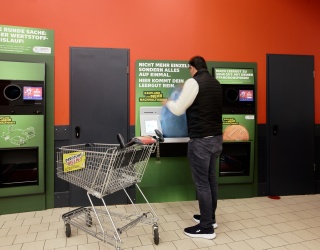
Retail does a lot to avoid waste, believes Kai Falk from the German Retail Federation HDE. He fights against further political obstacles and embraces the upcoming German Life-Cycle Resource Management Act as a step in the right direction. However, the retail federation opposes an additional tax on plastic bags and take-back requirements for all small electric appliances.
Critics blame food retailers of throwing away too much food. Are consumers too demanding? Is retail ordering too much for fear of empty shelves?
Retailers do everything they can to keep food waste as little as possible, be that by means of sophisticated inventory management systems that make it possible to adjust the supply of goods closer to the actual demand of consumers, or through shorter order intervals and smaller order sizes that all help to avoid waste with products at risk of being spoiled. In addition, the retail trade is one of the largest donors of food banks and donates food that can no longer be sold, but is still edible.
Apart from that, the amount of food waste is not as large in retail as is often assumed. The German EHI Retail Institute concludes that each year the equivalent of less than four kilos per consumer is being destroyed in German food retailing. This equates to a per capita merchandise value of 15 Euros per annum. By comparison: according to Cofresco, each year 80 kilos of food amounting to 310 Euros are being disposed of in general household waste.
With its power of demand, retail could do a lot for waste prevention in packaging. Is more pressure on manufacturers needed?
Commercial enterprises aim to organize their flow of goods as efficiently as possible. Unnecessary packaging incurs costs, and requires additional logistics and interrupts the flow of goods. That is why it’s in their own best interest of retailers to point out such mistakes to their suppliers.
What can retail do to increase the recycling rate for packaging in Germany?
Retailers join waste management companies and in this way ensure that the packaging waste incurred by them is being disposed of and recycled as intended. Additionally, retailers are obligated to take back outer packaging from their customers, which increases the collection rate. By doing so, it prevents recyclable packaging materials from being disposed of as general waste.
Has Germany’s dual system of waste disposal, for instance with the Green Dot (“Grüner Punkt”) failed?
No, the dual system of waste disposal has not failed. The competition between the dual systems has led to consumers not having to finance this disposal route through additional waste collection and disposal fees. However, the dual systems are still chronically underfunded and suffer from weak enforcement by the legislators. A fair funding of this system needs to be secured, before the yellow-top bin can be expanded into a recycling bin.
Are you pleased with the new German Life-Cycle Resource Managing Act?
The new Life-Cycle Resource Management Act encourages the recycling of waste. At the same time, now the path is clear for the introduction of a residential yellow bin in Germany. That’s why we view this Act as a step in the right direction. What’s positive about this is that the Federal Government of Germany wants to check after an introductory phase whether the regulation actually meets the requirements for efficiency as well as quality and quantity of recycling.
Each household gets an additional garbage can. Is that the right approach? Where should you put it if you live in the city?
The debate about the recycling bin shows that it doesn’t necessarily have to be additional garbage cans. It is just as much possible to further develop the already existing yellow bin into a new recycling bin. Even small electrical appliances could be residentially disposed of this way.
Germany’s Green Party asks for a tax on plastic bags. You are against it. Why?
With their proposal to tax plastic bags, the Green Party ignores the successes we are able to show in Germany. Thanks to the so-called ”Tütengroschen“(10 cents for a plastic bag), the consumption in Germany could be significantly reduced even without a legal obligation. In Germany, every consumer on average uses about 65 plastic bags per year, whereas US-Americans use five times as many bags in comparison. What’s more, in Germany plastic bags are captured in the German Packaging Regulation and the dual system of waste disposal and thus don’t end up somewhere by the side of the road. About three quarters of consumers use their shopping bags repeatedly.
When do you anticipate bioplastics for bags and packaging?
I would like to warn against too high expectations in this case. Plastic that is manufactured from renewable resources cannot be recycled just like that and more often than not in the end is getting burned. What’s more, manufacturing from renewable resources is water and energy intensive. Biodegradable plastics generally also only break down under controlled conditions.
Retail had to invest a lot of money in reverse vending machines for empty PET bottles. Did that pay off?
The political goal of reducing disposable packaging has not been achieved.
Do returnable glass bottles in the beverage selection no longer stand a chance against PET, cartons and cans?
That depends on the product. In the case of beer, the returnable bottle is by far the most preferred packaging.
Germany is Europe’s leader when it comes to recycling of old batteries, but many of them still end up in the trash. Can’t we do better?
Indeed, the collection rate for old batteries is still disappointing, even if Germany looks very good compared to the rest of Europe. It became evident that the mandatory redemption in retail is not the hoped-for panacea. In fact, it seems to prove true that many people dispose of batteries in their general garbage even if the nearest recycling center is close by. This effect needs to be looked into more closely, before new take-back requirements are being introduced, for example for electrical appliances.
The EU plans that electronics stores have to take back old small devices even if customers are not buying new ones. Does retail have to come to terms with this?
We are lobbying for an effective and regulated return of small electrical appliances. However, the guideline the European Parliament and Council have decided on now is not productive on several points. After all, Germany already has efficient redemption options through its recycling centers. It is wrong to now turn stores into scrap dealers. We demand the proper disposal of small electric appliances via the planned yellow bin in Germany.
Interview by René Schellbach, First publication EuroShop.de
01/07/2012







